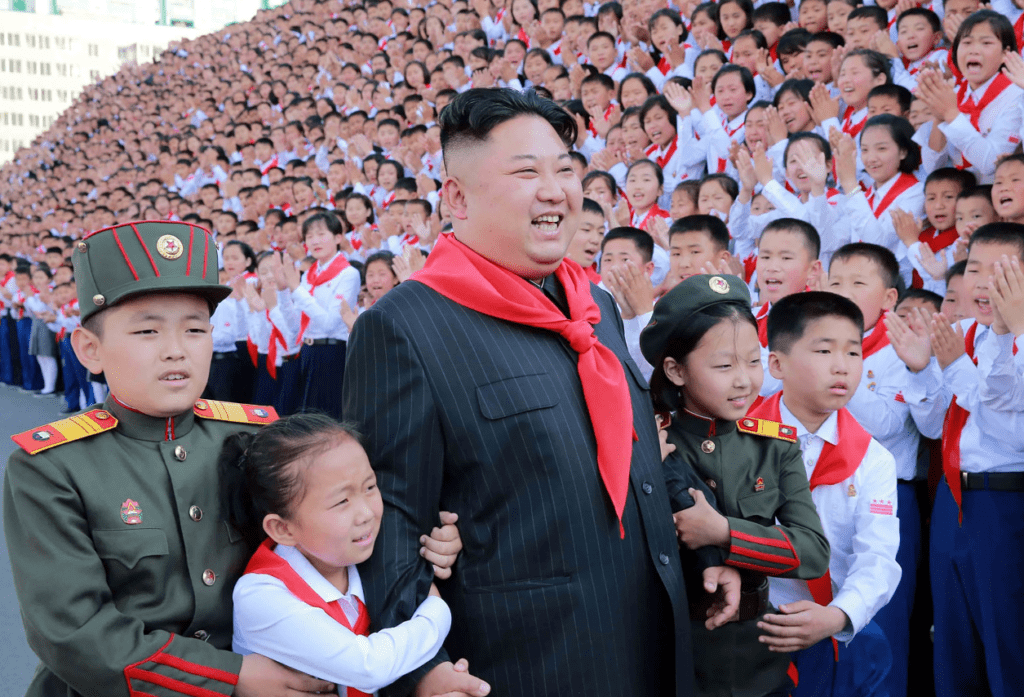Two weeks ago, North Korean leader Kim Jong Un unveiled his latest song, and he likely didn’t anticipate it becoming a sensation on TikTok.
Yet, the propaganda track has caught the attention of Generation Z, who are dancing to its catchy electro-pop rhythm.
Many TikTok users enjoying the song seem unaware of the lyrics’ praise for a dictator who has threatened to “thoroughly annihilate the US” and launched multiple ballistic missiles.
As one line in the song puts it: “Let’s sing Kim Jong Un, the great leader/ Let’s brag about Kim Jong Un, our friendly father.”
Despite the ominous content, many on TikTok are simply enjoying the upbeat tune. Comments on the platform include, “Wait, this slaps,” “This song needs a Grammy,” and “It’s so dystopian in the catchiest way.”
However, beneath the catchy beat, experts warn of a more sinister undercurrent.
Crafting a Catchy Propaganda Hit
“Friendly Father” is the latest in a series of propaganda pop songs North Korea has released over the past 50 years.
Its upbeat tempo and synthy melodies aren’t all that different from Western pop, but there’s a noticeable Soviet-era influence.
“In this case, the song has Abba written all over it,” says Peter Moody, a North Korea analyst at Korea University.
“It’s upbeat, it could not be more catchy, and a rich set of orchestral-sounding sequences could not be more prominent.”
While North Korean pop may sound like a commercial hit, its primary purpose is to propagate a political message. According to Alexandra Leonzini, a Cambridge University scholar who specializes in North Korean music, these songs must be easy to understand and sing, avoiding complex vocal arrangements or abstract phrasing.
Melodies must be simple, and the vocal range should suit the general population. North Korea’s regime tolerates no creative freedom—art is not an outlet for personal expression but a tool to reinforce loyalty to the state.
“All artistic output in North Korea must serve the class education of citizens and more specifically educate them as to why they should feel a sense of gratitude, a sense of loyalty to the party,” explains Leonzini.
The government’s “seed theory” mandates that each work contains a central ideological message that reinforces the regime’s goals.
North Korea’s lighter pop ensembles are intended for a domestic audience, while opera troupes and symphony orchestras are showcased on international stages.
In North Korea, propaganda songs are blasted over village loudspeakers every morning, and new tracks are distributed through newspapers, magazines, and government broadcasts.
Keith Howard, emeritus professor of musicology at London’s School of Oriental and African Studies, notes that the public quickly adopts these songs.
“By the time the song has sort of been taken into the body, it’s become part of the person,” he says.
“So they know the lyrics so well, even if they’re just doing the actions, even if they’re just listening to it. A good ideological song does that – it needs to embed the message.”
The Hidden Messages in the Lyrics
The recent track, “Friendly Father,” has a unique vocabulary shift that catches the attention of North Korea analysts.
References to Kim Jong Un as “father” and “the Great” are notable because such terms were previously reserved for his grandfather, Kim Il Sung.
This change could indicate Kim Jong Un’s efforts to strengthen his image as North Korea’s “Supreme Leader.”
He took power in 2012, succeeding his father Kim Jong Il, and has since adopted a more aggressive stance in his rhetoric, promising to boost North Korea’s military capabilities.
The altered lyrics in another propaganda song, where “our father Kim Il Sung” was replaced with “our father Kim Jong Un,” further support this interpretation.
As Alexandra Leonzini points out, “Songs are used to telegraph the direction the state is going in… to signpost important moments and important developments in politics. A song is almost like the newspaper in North Korea.”
TikTok’s Reaction and the Irony of the Viral Hit
While North Korea watchers analyze the lyrics for political implications, TikTok users continue to enjoy the music, with some commenting on its nostalgic qualities, comparing it to older Spanish, French, or Eastern European pop styles.
Others see the irony in a Communist song going viral on a Chinese-owned app while US lawmakers consider banning TikTok.
The app’s unpredictable nature has given rise to idiosyncratic trends, with British TikTokker Matas Kardokas gaining over 400,000 likes for his meme video featuring North Korean propaganda songs.
Despite the dark origins of these tracks, they have managed to capture the imagination of a new generation, raising questions about the blurred lines between entertainment and propaganda.
US Points To Rwanda And M23 Rebels In Fatal Attack On DR Congo Displacement Camp

